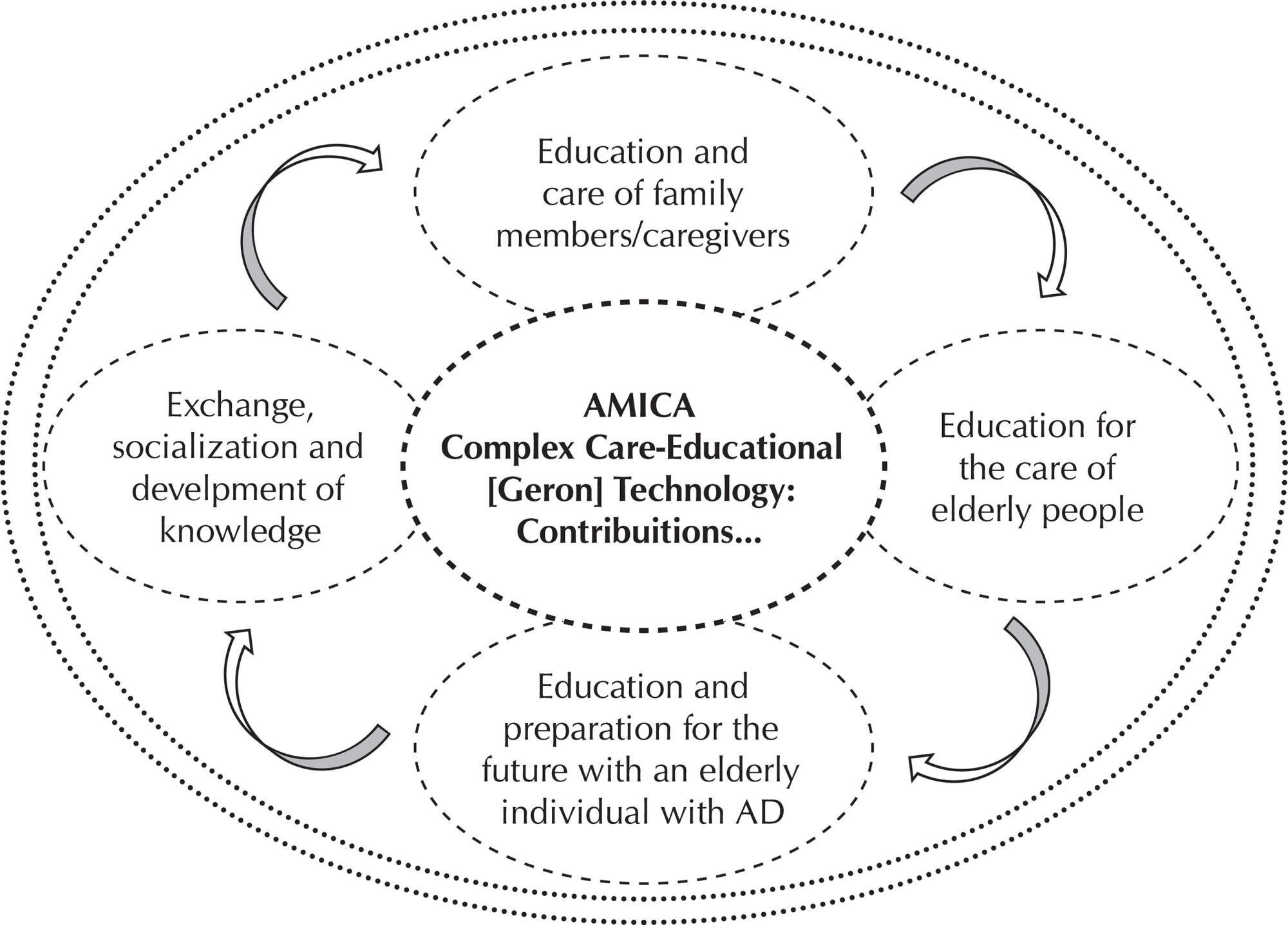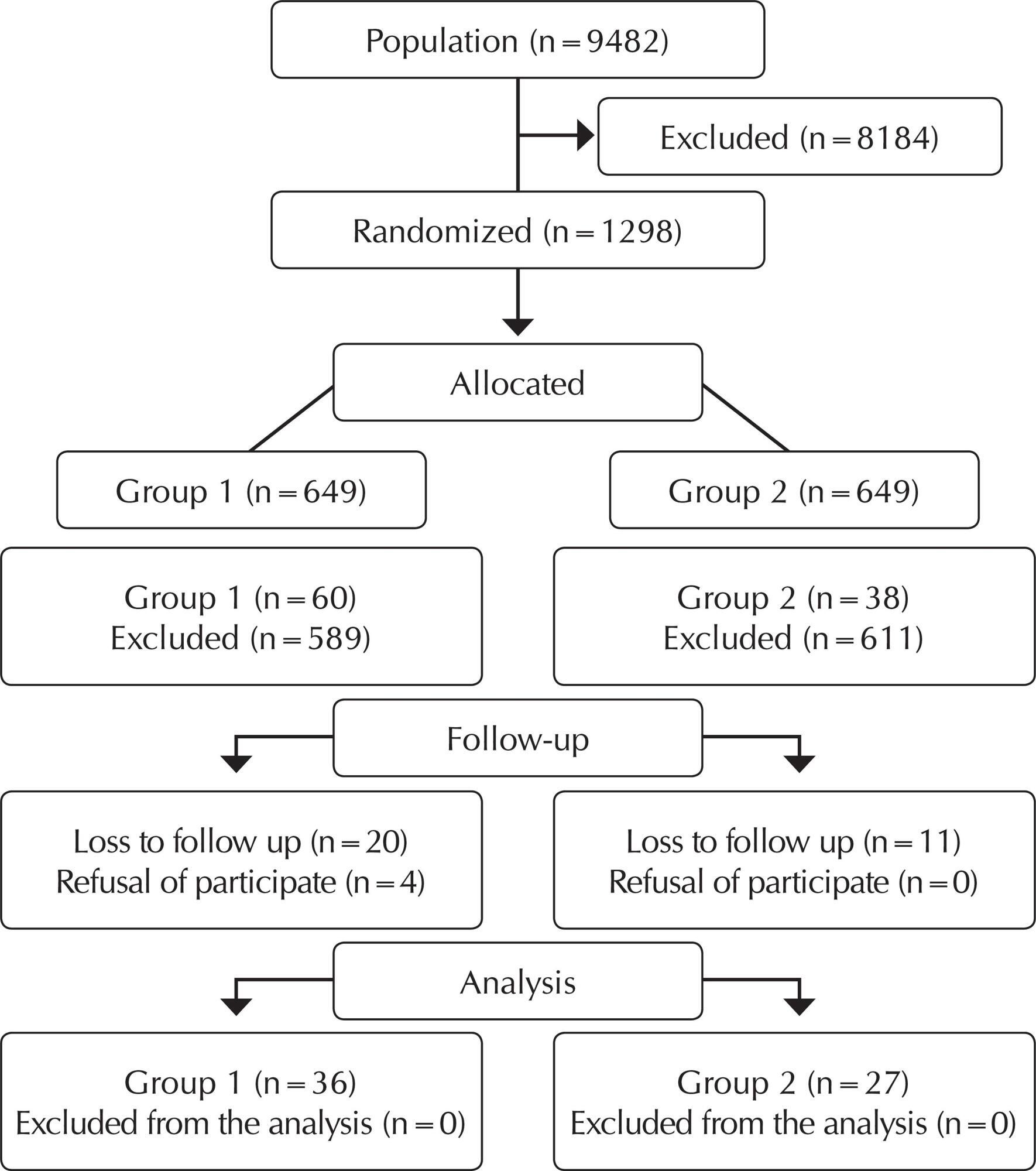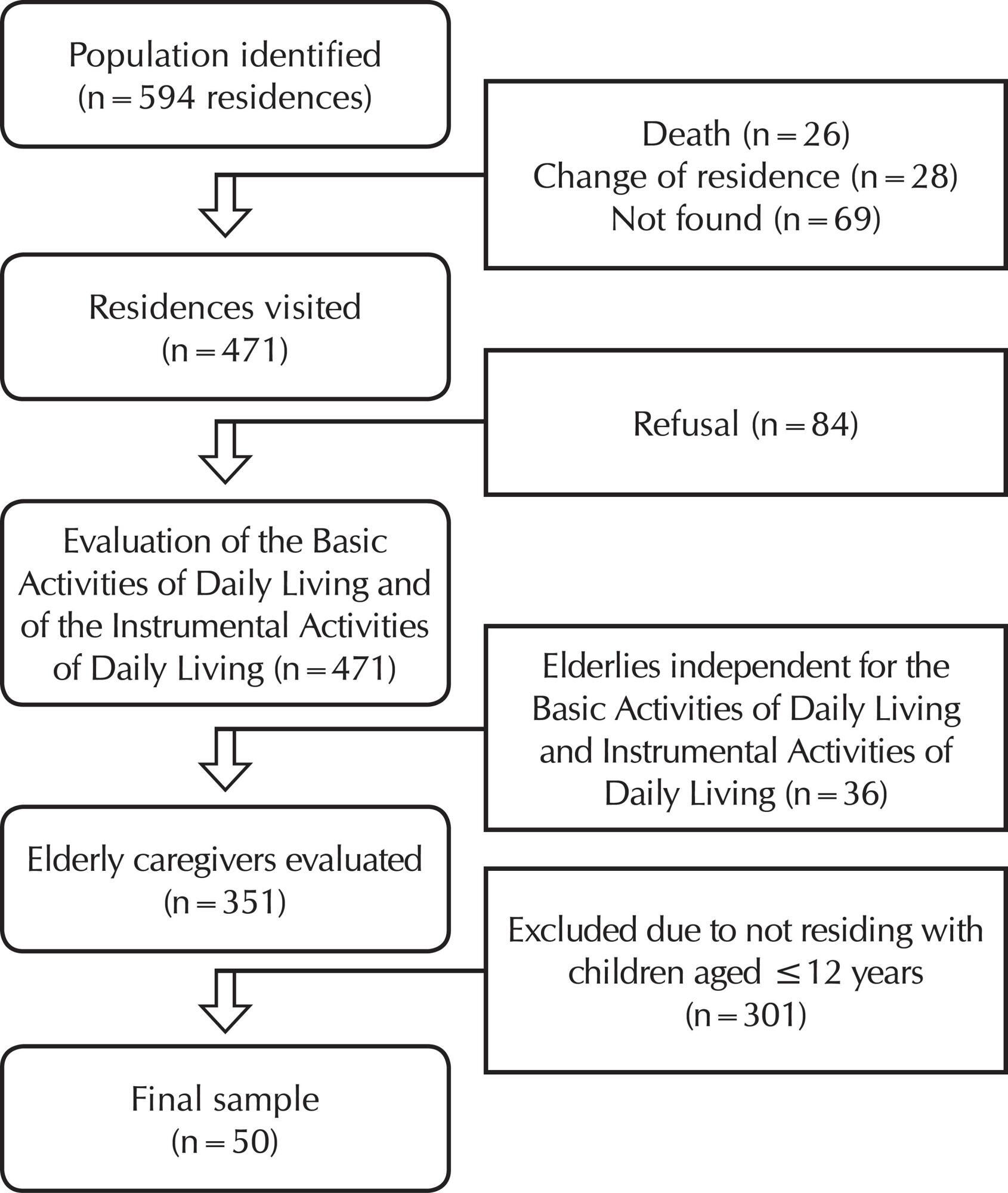-
RESEARCH01-01-2017
Complex educational and care (geron)technology for elderly individuals/families experiencing Alzheimer’s disease
Revista Brasileira de Enfermagem. 2017;70(4):726-732
Abstract
RESEARCHComplex educational and care (geron)technology for elderly individuals/families experiencing Alzheimer’s disease
Revista Brasileira de Enfermagem. 2017;70(4):726-732
DOI 10.1590/0034-7167-2016-0687
Views0See moreABSTRACT
Objective:
To describe the contributions of the Integrated Multidisciplinary Care Group for Caregivers of Individuals with Alzheimer’s Disease as an educational and care (geron)technology in the context of Alzheimer’s disease in elderly individuals from the perspective of family members/caregivers.
Method:
Exploratory, descriptive study with a qualitative approach conducted with 13 family members/caregivers of elderly people participating in the support group of a university institution of the state of Rio Grande do Sul, Brazil. Data collected between January and April 2016 through a semi-structured interview were submitted to discursive textual analysis.
Results:
Family members/caregivers pointed out education and care as contributions of the group; education for care and for the future; exchange, socialization, and development of knowledge through the range of knowledge existing in the Group.
Conclusion:
The Group contributes as a (geron)technology of care and education for care in which knowledge is built and applied in practice, supporting the experienced disorders and improving the quality of care provided for elderly individuals with Alzheimer’s disease.

-
RESEARCH01-01-2017
Falls in institutionalized older adults: risks, consequences and antecedents
Revista Brasileira de Enfermagem. 2017;70(4):719-725
Abstract
RESEARCHFalls in institutionalized older adults: risks, consequences and antecedents
Revista Brasileira de Enfermagem. 2017;70(4):719-725
DOI 10.1590/0034-7167-2017-0107
Views0See moreABSTRACT
Objective:
To analyze the occurrence of falls in institutionalized elderly addressing the risks, consequences and antecedents.
Method:
Cross-sectional study carried out with 45 older adults in Long-Term Care Facilities for the Older adult in João Pessoa, Brazil, in June and July 2016. A socio-demographic questionnaire and the Berg Balance Scale were applied, classifying as risk of fall scores lower than 45. Descriptive statistics and tests were conducted: independent t-test, Anova (Tukey), Chi-square, Mann Whitney. Statistically significance was p <0.05. Data were processed in SPSS version 19.0.
Results:
A total of 66.7% (30) falls occurred, 20% (9) of them in the external area, with 66.7% (30) of the participants having hypertension as a previous disease and, as consequence, the fracture was highlighted with 11.2% (5). The Berg Scale had different scores when compared to the falls suffered by the elderly and previous diseases influenced the occurrence of falls (p <0.05).
Conclusion:
It is necessary to implement public financing policies or partnerships that allow environments adaptations aiming at reducing the risks of falls.
-
RESEARCH01-01-2017
Factors associated with the functional capacity of older adults with leprosy
Revista Brasileira de Enfermagem. 2017;70(4):711-718
Abstract
RESEARCHFactors associated with the functional capacity of older adults with leprosy
Revista Brasileira de Enfermagem. 2017;70(4):711-718
DOI 10.1590/0034-7167-2017-0091
Views0See moreABSTRACT
Objective:
to investigate the association between socio-demographic and clinical factors and the functional capacity of older adults with leprosy.
Method:
cross-sectional analytical study conducted in Fortaleza, Ceará, Brazil, with 77 older adult patients with leprosy in a referral service, through interview, medical records and application of the Katz Index and the Lawton and Brody Scale.
Results:
the mean age was 68.23 years, with prevalence of men, in stable union/married, with mean monthly family income of 2.04 minimum wages, positive bacillary index, clinical dimorphic form and grade zero disability. In the Lawton and Brody scale, independence (58.5%) was predominant and associated to the variables “living arrangement” and “educational attainment”. Total independence (87.0%) was predominant in the Katz Index and statistically associated to the variable monthly family income.
Conclusion:
most of the participants were classified as independent in the instruments used. Furthermore, the instruments pointed to a greater number of associations with socio-demographic and clinical factors not related to leprosy.
-
RESEARCH01-01-2017
Effects of supportive telephone counseling in the metabolic control of elderly people with diabetes mellitus
Revista Brasileira de Enfermagem. 2017;70(4):704-710
Abstract
RESEARCHEffects of supportive telephone counseling in the metabolic control of elderly people with diabetes mellitus
Revista Brasileira de Enfermagem. 2017;70(4):704-710
DOI 10.1590/0034-7167-2017-0089
Views0See moreABSTRACT
Objective:
the purpose of this study was to evaluate the efficacy of telephone-based support for the metabolic control of elderly patients with diabetes mellitus.
Method:
a pragmatic study was conducted in two groups, called G1 (n=36) and G2 (n=27), at a health unit from the countryside of São Paulo state. Patients in G1 group received telephone support over four months, through 16 telephone contacts with educational material; for the G2 group the educational material was mailed.
Results:
significant differences were found. The G1 group showed a reduction of the parameters of fasting glucose, as well as systolic and diastolic blood pressure. In G2 group a modest reduction was noted in some parameters, with no significant difference.
Conclusion:
telephone support was effective to deliver patient education to the diabetic elderly, leading to the reduction of fasting blood glucose. This, combined with other strategies, can contribute to reduce glycated hemoglobin (NCT 01972412).

-
RESEARCH01-01-2017
Stress and optimism of elderlies who are caregivers for elderlies and live with children
Revista Brasileira de Enfermagem. 2017;70(4):697-703
Abstract
RESEARCHStress and optimism of elderlies who are caregivers for elderlies and live with children
Revista Brasileira de Enfermagem. 2017;70(4):697-703
DOI 10.1590/0034-7167-2017-0088
Views0See moreABSTRACT
Objective:
to evaluate the relation between stress and optimism of elderlies who are informal caregivers for elderlies and live with children.
Method:
cross-sectional study on 50 elderlies who provide care to elderlies, live with children, and are registered in the primary health care. The interviews occurred in the participant’s residence and we evaluated characteristics of the care-dependent elderly and of the children, sociodemographic characteristics, stress through the Perceived Stress Scale and optimism through the Pinto and Pais-Ribeiro Spirituality Scale, in the elderly caregiver. For statistical analysis we used the Spearman correlation test.
Results:
the mean level of stress was 23.9 points and of optimism was 3.3 points. Correlation analysis showed that the higher the level of optimism the significantly lower the level of perceived stress of elderlies who provided care to elderlies and lived with children.
Conclusion:
inversely proportional correlation was identified between stress and optimism.

-
RESEARCH01-01-2017
Spiritual well-being and quality of life of older adults in hemodialysis
Revista Brasileira de Enfermagem. 2017;70(4):689-696
Abstract
RESEARCHSpiritual well-being and quality of life of older adults in hemodialysis
Revista Brasileira de Enfermagem. 2017;70(4):689-696
DOI 10.1590/0034-7167-2017-0006
Views0See moreABSTRACT
Objective:
To analyze the relationship between spiritual well-being, sociodemographic, economic, religious, and health variables and the quality of life of older adults undergoing hemodialysis.
Method:
This was a cross-sectional and correlational study conducted with 169 older adults undergoing hemodialysis. The researchers conducted interviews to collect sociodemographic, economic, religious, and health data and applied the Spiritual Well-Being Scale (SWBS) and the WHO quality of life assessment (WHOQOL-BREF and WHOQOL-OLD).
Results:
Most of the older adults attained a moderate level of total spiritual well-being (SWB). In terms of QOL, the psychological domain (66.8; sd=13.9) and social relationships domain (66.8; sd=15.1) presented the highest mean scores. The WHOQOL-BREF domains were positively correlated with the SWB scale, with statistical significance among all domains and subscales except the environmental domain.
Conclusion:
The QOL of older adults was associated with the construct of SWB, either positively or negatively.
-
RESEARCH01-01-2017
Vulnerability of caregivers of the elderly with dementia: a cross-sectional descriptive study
Revista Brasileira de Enfermagem. 2017;70(4):682-688
Abstract
RESEARCHVulnerability of caregivers of the elderly with dementia: a cross-sectional descriptive study
Revista Brasileira de Enfermagem. 2017;70(4):682-688
DOI 10.1590/0034-7167-2016-0579
Views0See moreABSTRACT
Objective:
to evaluate the sociodemographic and clinical profile of the caregivers and its relation with the overburden from the care of the elderly with dementia.
Method:
a cross-sectional descriptive study; the sample was non-probabilistic, developed with caregivers of elderly people with dementia. The field of investigation was the Health Care Center of the Elderly and their Caregivers (CASIC), in the city of Niterói, Rio de Janeiro, Brazil. Data collection took place from February to June 2016, with the following instruments: a sociodemographic questionnaire and Zarit scale.
Results:
fifty percent of the caregivers presented moderate overburden; 38% presented little overburden; and 12% moderate/severe overburden. It was observed that the median of weekly care hours increases as the overburden increases. Caregivers with moderate to severe overburden, in the majority, do not share care.
Conclusion:
it is clear that the overburden of care places the caregiver in conditions of biological and psychological vulnerability.
-
RESEARCH01-01-2017
Therapeutic nursing care: transition in sexuality of the elderly caregiving spouse
Revista Brasileira de Enfermagem. 2017;70(4):673-681
Abstract
RESEARCHTherapeutic nursing care: transition in sexuality of the elderly caregiving spouse
Revista Brasileira de Enfermagem. 2017;70(4):673-681
DOI 10.1590/0034-7167-2016-0256
Views0See moreABSTRACT
Objective:
To understand the transitions experienced, and the conditions and expected response patterns to changes in sexuality of the spouse-caregiver of the elderly, during progression of the dementia process.
Method:
A qualitative research study, conducted at the neurogeriatric clinic between May of 2014 and May of 2015. An intensive, individual interview was administered to 12 elderly caregivers. Thematic content analysis was applied, using the theoretical model of Transition Theory.
Results:
Seven categories emerged, involving relationship and conjugal sexuality; disease repercussions; care and professional approach; attitudes, beliefs and social imagery of sexuality and care; family relationship and redefining of sexuality.
Final considerations:
Family development and marital life, the aspects of formation and development of sexuality, the specifics that involved living and caring for the other were understood, with successive events and changes influenced by old age, dementia, beliefs and social imagery.
-
ORIGINAL ARTICLE12-05-2019
Nurse care for the hospitalized elderly’s spiritual dimension
Revista Brasileira de Enfermagem. 2019;72:236-242
Abstract
ORIGINAL ARTICLENurse care for the hospitalized elderly’s spiritual dimension
Revista Brasileira de Enfermagem. 2019;72:236-242
DOI 10.1590/0034-7167-2018-0685
Views0See moreABSTRACT
Objective:
to analyze the nurse care for the spiritual hospitalized elderly’s dimension.
Method:
a qualitative study, based on Jean Watson’s Theory of Human Caring. The study included 17 nurses working in a geriatric center in Salvador City, Bahia State, Brazil. The collection of testimonies occurred between January and April of 2018, through an interview.
Results:
spiritual care were dialogue, encouragement and respect for religious activities, embracement, empathy. One of the obstacles to providing this care was the lack of preparation in accessing the elderly’s spiritual dimension.
Final considerations:
spirituality is a dimension of human and holistic nursing care. Caring for the spirit contributes to foster transpersonal care. The difficulty may be in the lack of nurses’ preparation. It is necessary that they cultivate and live their own spirituality, transmitting the understanding in each care relationship.
-
REFLECTION05-11-2022
Nursing Process in the Brazilian context: reflection on its concept and legislation
Revista Brasileira de Enfermagem. 2022;75(6):e20210898
Abstract
REFLECTIONNursing Process in the Brazilian context: reflection on its concept and legislation
Revista Brasileira de Enfermagem. 2022;75(6):e20210898
DOI 10.1590/0034-7167-2021-0898
Views0ABSTRACT
Objectives:
to reflect on the global understanding of the Nursing Process concept, with emphasis on the Brazilian context.
Methods:
a reflection article, aligned with the vision and expertise of researchers who are members of the Nursing Process Research Network.
Results:
the reflection is presented in two main topics: The evolution of Systematization of Nursing Care X Nursing Process concepts and its consonance with national and international practices, and Brazilian legislation; The Nursing Process concept realignment in Brazilian legislation in line with current care, teaching and research practices. Final Considerations: the reflections were oriented to the Nursing Process’ conceptual, normative and legal issues, including elements of its historical evolution, and, with that, pointed to the need to modify the Brazilian regulation on the Nursing Process.
Keywords:Education, NursingLegislationNursingNursing CareNursing ProcessStandardized Nursing TerminologySee more -
ORIGINAL ARTICLE12-13-2019
Hammock and nesting in preterm infants: randomized controlled trial
Revista Brasileira de Enfermagem. 2019;72:96-102
Abstract
ORIGINAL ARTICLEHammock and nesting in preterm infants: randomized controlled trial
Revista Brasileira de Enfermagem. 2019;72:96-102
DOI 10.1590/0034-7167-2018-0099
Views0See moreABSTRACT
Objective:
To compare the physiological variables and the sleep-wake pattern presented by preterm in nesting and hammock positions after diaper change.
Method:
This is a crossover randomized controlled trial. It was conducted with 20 preterm infants who, after diaper change, were placed in nests or hammocks. These preterm infants were evaluated for physiological variables (heart rate and oxygen saturation) and behavioral variables (sleep and wakefulness).
Results:
There was no statistically significant difference in the studied variables between nesting and hammock positions. However, regarding the categorical variable sleep, the comparison between the research phases for the hammock position showed differences between the baseline phase and the immediate recovery (p=0.00), baseline and late recovery (p=0.00), response and immediate recovery (p=0.00), response and late recovery (p=0.00).
Conclusion:
No differences were identified between the nest and the hammock; however, the use of the hammock favored the sleep of preterm infants compared to its non-use.

-
ORIGINAL ARTICLE12-13-2019
Cervical cancer: knowledge, attitude and practice on the prevention examination
Revista Brasileira de Enfermagem. 2019;72:25-31
Abstract
ORIGINAL ARTICLECervical cancer: knowledge, attitude and practice on the prevention examination
Revista Brasileira de Enfermagem. 2019;72:25-31
DOI 10.1590/0034-7167-2017-0645
Views0ABSTRACT
Objective:
to evaluate the knowledge, attitude and practice of women on the cervical-uterine cancer screening and to investigate their association with sociodemographic variables.
Method:
a cross-sectional study, carried out from July to September 2015, with 500 women enrolled in the Basic Health Units of the Health District V, of the city of Recife-PE. For data collection, a semi-structured form was used. In statistical analysis, the Chi-square test and Fisher’s Exact Test were applied and, in the multivariate analysis, the Poisson model and Wald statistic.
Results:
the prevalence of adequate knowledge, attitude and practice was 35.2%, 98% and 70.6%, respectively. Adequate knowledge was associated with having no children, having a family income of two minimum wages and Spiritist/Afro-Brazilian religion.
Conclusion:
women carry out the examination, deem it necessary, but do not have adequate knowledge, which demonstrates the need for educational actions by nurses and other health professionals.
Keywords:Knowledge, Attitudes and Practice in HealthNursingPapanicolaou TestUterine Cervical NeoplasmsWomen's HealthSee more -
REFLECTION02-15-2021
Pre-hospital assistance by ambulance in the context of coronavirus infections
Revista Brasileira de Enfermagem. 2021;74:e20200657
Abstract
REFLECTIONPre-hospital assistance by ambulance in the context of coronavirus infections
Revista Brasileira de Enfermagem. 2021;74:e20200657
DOI 10.1590/0034-7167-2020-0657
Views0ABSTRACT
Objective:
To reflect on the safe care exercised by the pre-hospital care team by emergency ambulance in times of coronavirus infection.
Method:
A reflection and description of how to provide safe care to the patient and the professional during pre-hospital care in times of coronavirus infection.
Results:
To ensure the health of all those involved in the care, health professionals who work in pre-hospital care by emergency ambulance should use the recommended Personal Protective Equipment (PPE), such as the use of surgical masks and N95, N99, N100, PFF2 or PFF3, the use of an apron or overall, goggles and face shield, gloves and a hat. The entire team must receive training and demonstrate the ability to use PPE correctly and safely.
Final considerations:
The professional working in the pre-hospital care by ambulance is exposed to a series of occupational risks that need to be discussed and minimized through professional training.
Keywords:AmbulanceCoronavirus InfectionsEmergency Medical ServicesPatient SafetyPre-Hospital AssistanceSee more -
ORIGINAL ARTICLE06-16-2021
Patient participation in care safety: Primary Health Care professionals’ perception
Revista Brasileira de Enfermagem. 2021;74(2):e20200773
Abstract
ORIGINAL ARTICLEPatient participation in care safety: Primary Health Care professionals’ perception
Revista Brasileira de Enfermagem. 2021;74(2):e20200773
DOI 10.1590/0034-7167-2020-0773
Views0ABSTRACT
Objectives:
to analyze health professionals’ perception about the meaning and practice of patient involvement in care safety in Primary Health Care.
Methods:
this is an exploratory, qualitative study, developed with 22 professionals in the Federal District, Brazil. A semi-structured interview was conducted between October and November/2018. Content analysis was carried out according to Bardin.
Results:
nurses, physicians, dentists, among others, participated. The following categories emerged: Meaning of patient involvement in care safety; Factors intervening in patient involvement in care safety; Strategies for patient involvement in care safety; Qualification for patient involvement in care safety.
Final Considerations:
the meaning of patient involvement for care safety was associated with co-responsibility and patient-centered care. Professionals’ practice revealed intervening factors and the use of involvement strategies. A gap was identified in training on patient involvement in care safety.
Keywords:Knowledge Management for Health ResearchPatient ParticipationPatient SafetyPrimary Health CareProfessional PracticeSee more -
Emotional labor of nurses in the front line against the COVID-19 pandemic
Revista Brasileira de Enfermagem. 2021;74:e20200660
Abstract
Emotional labor of nurses in the front line against the COVID-19 pandemic
Revista Brasileira de Enfermagem. 2021;74:e20200660
DOI 10.1590/0034-7167-2020-0660
Views0See moreABSTRACT
Objective:
To analyze nurses’ experiences in the front line of the fight against the COVID-19 pandemic regarding the performance of emotional labor (EL), aiming at its characterization and identification of support strategies and development opportunities of nurses and practices.
Methods:
Qualitative, descriptive, and exploratory study, with content analysis of eleven written narratives and reports from a focus group composed of nurses with experience in caring for patients with COVID-19 from different Hospital Centers in Lisbon, Portugal.
Results:
Five themes were extracted: 1) Challenges experienced by nurses in the frontline; 2) Emotions experienced by nurses in service care; 3) Emotional responses of nurses and patients: impact on care; 4) EL of nurses in the patient care process; 5) Opportunities for development in the face of the emotional challenge required of nurses in combating COVID-19.
Final considerations:
The nurses demonstrated the ability to transform this profoundly emotional experience positively.

Search
Search in:
Nuvem de Tags
Aged (144) Atenção Primária à Saúde (239) COVID-19 (104) Cuidados de Enfermagem (269) Educação em Enfermagem (151) Educação em Saúde (139) Enfermagem (930) Estudos de Validação (131) Health Education (144) Idoso (208) Mental Health (149) Nursing (987) Nursing Care (306) Patient Safety (151) Primary Health Care (284) Qualidade de Vida (104) Quality of Life (106) Saúde Mental (145) Segurança do Paciente (150) Validation Studies (108)



